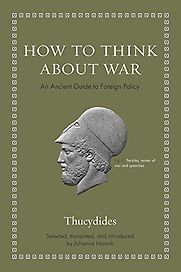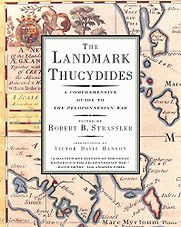How to Think about War: An Ancient Guide to Foreign Policy
by Johanna Hanink & Thucydides
How to Think about War by Johanna Hanink, a classicist at Brown University, is a translation of key speeches from Thucydides’ History of the Peloponnesian War as well as an introduction and explanation of what it’s is all about.
We all pay lip service to learning the lessons of history, but knowing what exactly those lessons are is a tougher call. In How to Think About War: An Ancient Guide to Foreign Policy, Johanna Hanink gives her take on the lessons we can take away from Thucydides, the Greek historian and general (strategos), through whose writings we know about the history of the Peloponnesian War.
Of the many dead historians—and we’re talking about one who has been dead nearly two-and-half millennia—few seem to be as actively impacting foreign policy thinking as Thucydides. As Hanink writes in her preface, “Senior political officials are once again intimating that they take cues from his work, while Graham Allison’s notion of the ‘Thucydides Trap’ has been met with considerable fanfare (and criticism).”
The beauty of this short book, How to Think About War, is that you’re introduced to Thucydides on a number of levels. In the introduction, Hanink gives a brief overview of the history of this period. We learn of the rise of the Athenian Empire from nothing, and the Peloponnesian War that ensued after it got too big for its boots and annoyed the Spartans, who felt threatened by this rising power (the so-called Thucydides trap which, according to Graham Allison, we’re witnessing with China’s rise today). Then there’s the Sicilian Expedition, where the Athenians bring disaster upon themselves.
We also learn about how Thucydides, and especially the speeches that he put in the mouths of his Athenian characters, influenced American foreign policy after World War II and neoconservative thinking in particular.
Then comes the writing of Thucydides himself. Hanink has chosen a number of the speeches delivered by Athenians in The History of the Peloponnesian War, such as Pericles’s funeral oration. It’s a Thucydides Greatest Hits for those of us who do not have time to read the full eight books (though Thucydides actually organized his work by campaigning season, so the “the text’s arrangement in eight books is not his own,” says Hanink).
In terms of the layout of the book, the Ancient Greek text appears on the left-hand pages, and Hanink’s translation in English on the right-hand pages. The book is part of a wonderful series of Ancient Greek and Latin texts published by Princeton University Press, which also includes Cicero (our most important source for the Latin language) and Epictetus (the freed Greek slave who was key in the development of Stoicism). We highly recommend all the books in the series if you like ancient languages, but find the translations of the Loeb Classical Library a bit dated and are happy to have the highlights of authors picked out for you, rather than reading the entire opus. I have to say though, that of the ones I’ve read, How to Think About War is my favourite so far.
Thucydides is not easy Greek—if you’re learning the language, Herodotus might be a better text to start off with—but it’s wonderful to have it right there to compare the original text with Hanink’s rendering of it. And it’s really exciting to be back in Ancient Athens, hearing Pericles being modest about his speaking abilities or Nicias warning the other Athenians that invading Sicily is just not a great idea. This period of direct democracy in Athens is just so mythical, it’s amazing that you can actually read what they were saying to each other. Perhaps the speeches are not reported verbatim; they may even bear little resemblance to the original words. But it’s still a contemporary’s account of them, which is good enough for me.
The beauty of Thucydides, as Hanink reveals, is that you end up not really knowing for sure what he thought about anything—which characters he sympathizes with, what he regards as a good idea or a bad one. The neocons came away with a certain idea of Thucydides (intervention in foreign countries to promote your ideology is a good plan); Hanink suggests their take-home was the wrong one: “the reader who turns to these speeches in search of practical ancient wisdom is strongly encouraged to do so with the ultimate fate of the Thucydides’ Athens in mind.” Like all history, we walk away with, hopefully, a more complex and detailed picture of the past, but only a subjective understanding of what that past actually teaches us about how to behave in the present.
 Sophie Roell, Five Books Editor
Sophie Roell, Five Books Editor








Five Books review